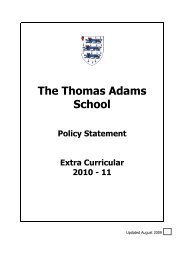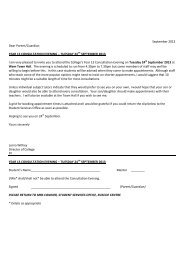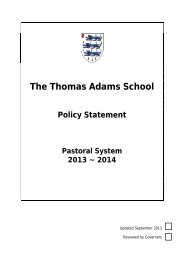Praise and Rewards - Thomas Adams School
Praise and Rewards - Thomas Adams School
Praise and Rewards - Thomas Adams School
Create successful ePaper yourself
Turn your PDF publications into a flip-book with our unique Google optimized e-Paper software.
This policy reflects the <strong>School</strong>’s continued belief in the “Every Child Matters” agenda which<br />
states that all pupils should:<br />
<br />
<br />
<br />
<br />
<br />
Be Healthy<br />
Stay Safe<br />
Enjoy <strong>and</strong> Achieve<br />
Achieve Economic Well-being<br />
Make a Positive Contribution<br />
<strong>and</strong> with the recognised Safeguarding Procedures within school, including Child Protection<br />
<strong>and</strong> Health <strong>and</strong> Safety. These highlight the need for this policy to take into account the<br />
Social <strong>and</strong> Emotional Aspects of Learning (SEAL):<br />
<br />
<br />
<br />
<br />
<br />
Self awareness<br />
Managing feelings<br />
Motivation<br />
Empathy<br />
Social Skills<br />
for all those working <strong>and</strong> learning within our school.<br />
<strong>Praise</strong><br />
The very best schools have praise cultures both in their classrooms <strong>and</strong> also within every aspect of<br />
their schools, whereby students all receive praise on a continuous basis which is;<br />
o justified<br />
o personalised, in that it is based on a good knowledge <strong>and</strong> underst<strong>and</strong>ing of<br />
individual students<br />
o delivered sensitively in ways which the individual student prefers<br />
backed up by communicating this to parents <strong>and</strong> family on every opportunity.<br />
Introduction<br />
There are few more valuable forms of both reward <strong>and</strong> also motivation than justified praise<br />
<strong>and</strong> recognition of achievement. Studies show that children respond quite remarkably to<br />
systems of positive reward <strong>and</strong> there is immense educational gain.<br />
The basic problems of a school's positive rewards system are, however, hard to overcome:-<br />
i. Teachers vary in st<strong>and</strong>ard <strong>and</strong>/or frequency of praise giving.<br />
ii. Teachers vary in how much time they give to making use of praise systems.<br />
iii. Monitoring to ensure consistency is difficult.<br />
iv. It is equally difficult to ensure that every student is receiving appropriate <strong>and</strong> deserved levels<br />
of praise <strong>and</strong> as a result less able <strong>and</strong> also quieter, hard working students in particular often<br />
do not get enough recognition.<br />
v. Students vary in the way they wish to receive praise <strong>and</strong> rewards.<br />
In the last resort a school has to rely on all teachers making use of the system whilst<br />
making use of procedures that are continuously highlighted <strong>and</strong> involve as little work as<br />
possible for the teacher.<br />
Criteria for Positive rewards<br />
1. All praise should be justified <strong>and</strong> based on high expectations <strong>and</strong> st<strong>and</strong>ards.<br />
2. All students should have equal opportunity to receive praise regardless of ability<br />
level.









![HE Newsletter 2 Vol 2[1] - Thomas Adams School](https://img.yumpu.com/38376964/1/184x260/he-newsletter-2-vol-21-thomas-adams-school.jpg?quality=85)






